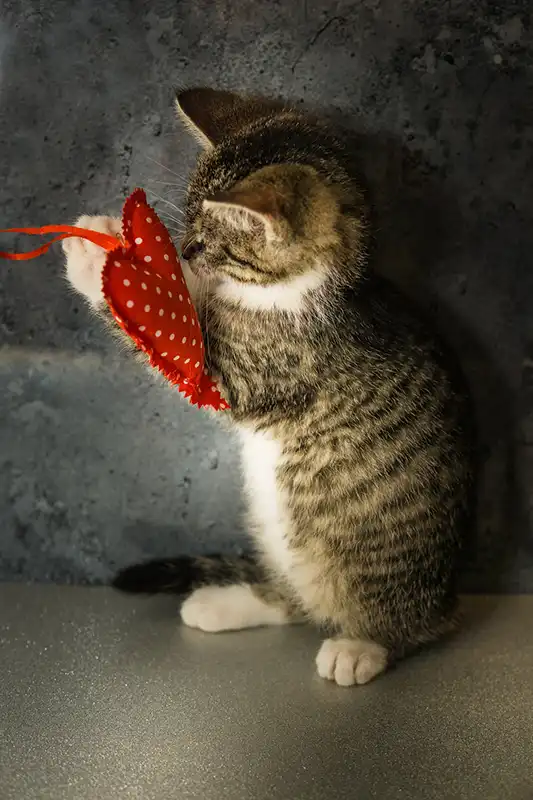Here at All Cats Clinic, we understand that bringing home a new kitten is like welcoming a tiny, adorable tornado into your life. As your local veterinarians in Northwest Arkansas, we see countless new kitten parents walk through our doors with that purrfect mix of excitement and panic. Don’t worry – we’ve got your back with proven kitten care tips that will help you survive and thrive during those first crucial months.
Whether you’ve just adopted your first kitten or you’re welcoming another feline overlord into your kingdom, mastering newborn kitten care and first-time kitten owner basics will set you up for success. Trust us, your future self will thank you for getting these kitten health basics right from the start.
Setting Up Your Home for Maximum Kitten Chaos (In a Good Way!)
Think of kitten-proofing as preparing for a very small, very curious house guest who happens to have ninja-level climbing skills and a huge capacity for mischief. Your new feline friend needs a safe space to explore without turning your home into their personal obstacle course. Start with a designated kitten headquarters – one quiet room equipped with all the essentials: litter box, food bowls, cozy bed, and age-appropriate toys.
The biggest mistake new parents make? Giving their furry pal free rein of the entire house immediately. This overwhelms your kitten and increases the chances of accidents or mysterious disappearances behind appliances, especially in a larger home. Keep them contained initially, then gradually expand their territory as they adjust.
Remove potential hazards before your four-legged buddy arrives. Kittens possess an uncanny ability to find the most dangerous item in any room. Here’s your essential kitten-proofing checklist:
- Secure all electrical cords with cord protectors or tape them down
- Remove toxic plants like lilies, poinsettias, and philodendrons. (Click here for a full list of toxic and non-toxic plants from the ASPCA.)
- Install safety latches on cabinets containing cleaning supplies or medications
- Close off access to small spaces behind appliances where kittens can get stuck
- Remove or secure small objects that could be swallowed (rubber bands, hair ties, buttons)
- Install window screens and secure balcony railings
- Remove breakable items from surfaces your kitten can reach
Remember, if it exists, your kitten will probably try to climb it, chew it, or knock it off a high surface.
Read more petproofing tips at the American Humane Society website here.
Feeding Your Tiny Food Critic
Kittens are surprisingly picky eaters who also happen to need significantly more calories per pound than adult cats. They’re basically tiny athletes in training, requiring high-quality kitten food specifically formulated for growing cats. Skip the adult food or generic options – your growing feline companion deserves the nutritional equivalent of premium fuel.
Establish a steady feeding schedule. Young kittens need several smaller meals daily, though you’ll need to gradually reduce the schedule to two meals by six months. Scheduled feeding helps with house training, as cats typically need the litter box shortly after eating. It also makes it easier to monitor appetite, which is a key health indicator.
Here’s a fun fact: kittens have tiny stomachs but huge energy needs, so they eat small amounts frequently. Think of them as furry hummingbirds who happen to purr, pounce, and use litter boxes.
Litter Box Success
Most kittens instinctively understand litter boxes, but success in this area ultimately depends on your setup game. Location matters tremendously – choose somewhere quiet but accessible, away from food bowls. Your feline pal prefers privacy, but shouldn’t need a GPS to find their bathroom.
Start with a box that has low sides for easy kitten access, and use unscented, non-clumping litter initially. Many kittens are sensitive to strong fragrances, and dusty litters can irritate their delicate respiratory systems. Plus, clay and clumping litters can be dangerous for tiny furballs, as they can cause serious issues if ingested.
Keep it clean – cats are fastidious creatures who judge us harshly for subpar bathroom maintenance.
Pro tip from our veterinary clinic: If accidents happen, clean thoroughly with enzymatic cleaners to eliminate odors completely. Regular household cleaners won’t remove scent markers that might encourage repeat offenses.
Healthcare That Actually Matters
Your kitten’s first vet visit should happen within days of adoption, even if they seem healthy. This establishes baseline measurements and catches potential problems before they become expensive emergencies. Bring any available medical records and be prepared to discuss diet, behavior, and any concerns.
Vaccination schedules typically begin around six to eight weeks, with boosters needed every three to four weeks until your pet is about sixteen weeks old. Core vaccines protect against serious diseases, many of which can be fatal in young cats. Never skip or delay these – those young immune systems need all the help they can get.
We offer PUREVAX, which is an excellent option for protecting your little buddy against dangerous disease. Click here to read our blog on it.
Parasite prevention deserves special attention because kittens are basically parasite magnets. Internal worms are extremely common and can cause serious health issues if ignored. Your veterinary team will recommend appropriate prevention based on your kitten’s specific needs.
Socialization: Raising a Confident Cat
The socialization window between two and seven weeks is critical. However, many adopted kittens miss some of this period. That’s where you come in! Gradually introduce your furry bestie to positive experiences: different textures, sounds, gentle handling, and controlled interactions with people and pets.
Handle your kitten regularly to prepare them for future grooming, cuddles, and medical care. Touch their paws, ears, mouth, and belly while offering treats. This investment pays dividends when nail trims and vet visits become routine rather than wrestling matches.
Remember, confidence builds gradually. A kitten who seems brave one day might be more cautious the next. That’s perfectly normal during development.
Red Flags That Need Immediate Attention
Recognizing illness early can save your kitten’s life. Young cats can deteriorate quickly due to their small size and developing immune systems. Changes in appetite, energy, or bathroom habits often signal problems before other symptoms appear.
Never ignore respiratory symptoms like persistent sneezing, nasal discharge, or difficulty breathing. Upper respiratory infections spread rapidly and can quickly become pneumonia without treatment. Digestive issues including vomiting, diarrhea, or constipation also require prompt veterinary attention in kittens.
When in doubt, call your vet. We’d rather see a healthy kitten unnecessarily than miss a critical window for treatment.
Exercise and Play: Channeling Your Kitten’s Inner Hunter
Kittens have energy levels that would make marathon runners jealous. They need appropriate outlets for hunting instincts, climbing behaviors, and social play. Interactive play sessions should happen multiple times daily, especially during natural hunting times around dawn and dusk.
Provide a variety of toys: feather wands for hunting simulation, balls for independent play, and puzzle feeders for mental stimulation. Create vertical spaces with cat trees or shelving systems – your feline overlord needs elevated territory to survey their kingdom.
Of course, part of the fun of having a kitten is those zoomies! (We did a blog on that, too. Click here to read it.)
Fun fact: Cats naturally follow a hunt-catch-kill-eat sequence. End play sessions with a small treat to satisfy this instinct and help your four-legged friend settle down for rest.
Grooming Without the Drama
Start grooming routines early to prevent future struggles. Even short-haired cats benefit from regular brushing, nail trims, and dental care. Make it positive with treats and praise during short sessions, gradually increasing duration as your furry pal becomes comfortable.
Don’t forget dental care! Start by letting your kitten taste cat-specific toothpaste, then gradually introduce touching teeth and gums. Prevention now saves expensive dental procedures later.
Indoor Enrichment for Happy Cats
Indoor cats live longer, healthier lives than outdoor cats, and are happiest when their environment provides adequate stimulation. Create multiple scratching surfaces using different materials and orientations – vertical posts, horizontal pads, and angled options satisfy various preferences.
Window access provides endless entertainment through “cat TV.” Bird feeders or garden areas visible from windows create fascinating viewing for your indoor hunter. Hiding spots and cozy retreats throughout your home let cats choose their comfort level based on mood.
You can read more helpful information about kitten care at the RSPCA website here. PetMD is another great resource for info on kitten care. You can read their article on kitten socialization here.
Frequently Asked Questions
How often should I feed my kitten?
Kittens under twelve weeks need four meals daily, reducing to three meals until six months, then twice daily as adults.
When do kittens start using litter boxes?
Most kittens instinctively use boxes by four to five weeks, but consistency improves with proper setup and patience.
What vaccines does my kitten need?
Core vaccines include panleukopenia, rhinotracheitis, calicivirus, and rabies, starting around six to eight weeks with regular boosters.
How do I know if my kitten is sick?
Watch for changes in appetite, energy, bathroom habits, or behavior. Lethargy, vomiting, diarrhea, or difficulty breathing need immediate attention. Contact your Northwest Arkansas vet immediately if you notice anything wrong. Kittens are very fragile, and can get very sick very fast.
When should my kitten be spayed or neutered?
Most vets recommend four to six months of age, though some perform procedures earlier based on individual development.
What’s normal kitten behavior?
Expect high energy, curiosity, playfulness, and plenty of mischief. Sudden behavior changes or hiding may indicate illness.
Visit Our Northwest Arkansas Veterinary Clinic for Expert Kitten Care
At All Cats Clinic, we love helping new kitten parents navigate the adventure of raising healthy, happy cats. These kitten care tips that actually work make all the difference in building lifelong bonds with your feline companion. Whether you need wellness care, have questions about your new furry overlord’s latest antics, or need emergency services, our experienced team is here to help.
Are you looking for a great veterinary clinic near me in Northwest Arkansas? You can try searching for a vet near me, or simply call us to schedule your kitten’s first appointment and start this amazing journey on the right paw!
Visit our Service page here for more insight about our feline-only veterinary clinic and the services we offer.
This blog is meant to be informational only. Always consult with your veterinarian for the right medical advice, diagnosis, or treatment plan for your pet and follow their advice.






!Social Media Icons